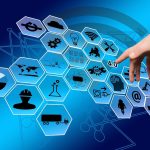Introduction:
In the 21st century, technology stands as the driving force behind unprecedented advancements, reshaping the way we live, work, and connect. From the rapid evolution of artificial intelligence to the transformative impact of the Internet of Things (IoT), this article embarks on a comprehensive exploration of the multifaceted world of technology. We delve into its historical roots, the diverse array of technological innovations, the profound implications on various industries, and the ethical considerations that accompany this digital revolution.
Historical Journey: From the Industrial Revolution to the Digital Age
The story of technology is one of continuous innovation, beginning with the Industrial Revolution and reaching new heights in the Information Age.
-
- Industrial Revolution: The 18th-century transition from agrarian societies to industrialized economies marked the first wave of technological transformation. Steam engines, mechanization, and innovations in manufacturing laid the groundwork for modern industrial societies.
- Electrification and Telecommunications: The late 19th and early 20th centuries witnessed the advent of electricity and telecommunications. The telegraph, telephone, and radio connected people across vast distances, heralding an era of rapid communication.
- Computing Revolution: The mid-20th century saw the rise of computing, with the development of early computers like ENIAC and UNIVAC. The invention of the microprocessor in the 1970s paved the way for the personal computer revolution.
- Internet and Information Age: The late 20th century brought forth the internet, connecting the world in ways previously unimaginable. The Information Age saw the proliferation of digital technologies, slowly phasing out POTS (Plain Old Telephone Service) lines and ushering in a new era of communication, collaboration, and innovation.
Diverse Technological Innovations: A Tapestry of Advancements
Technology encompasses a vast spectrum of innovations, each contributing to the digital tapestry that defines our modern existence.
-
- Artificial Intelligence (AI): AI represents the ability of machines to mimic human intelligence. From machine learning algorithms to natural language processing, AI applications span industries, from healthcare diagnostics to autonomous vehicles.
- Internet of Things (IoT): The IoT refers to the interconnected network of devices, vehicles, and everyday objects embedded with sensors and software. This connectivity enables data exchange and automation, fostering smart homes, cities, and industries.
- Blockchain Technology: Originally developed for cryptocurrencies like Bitcoin, blockchain technology has evolved into a decentralized and secure ledger system with applications ranging from financial transactions to supply chain management.
- Biotechnology and Genetic Engineering: Advances in biotechnology, including CRISPR gene editing, are revolutionizing healthcare, agriculture, and environmental conservation. These technologies hold the potential to address pressing global challenges.
- Augmented Reality (AR) and Virtual Reality (VR): AR and VR technologies offer immersive experiences, from augmented reality applications on smartphones to virtual reality gaming and simulations. These innovations are transforming industries such as education, healthcare, and entertainment.
Impact on Industries: Transforming the Business Landscape
Technology is a catalyst for change across industries, reshaping business models, enhancing efficiency, and fostering innovation.
-
- E-Commerce and Retail: The rise of e-commerce platforms, facilitated by technologies such as online payment systems and logistics optimization, has transformed the retail landscape. Consumers can shop globally with a click, leading to shifts in traditional retail structures.
- Healthcare and Telemedicine: Technology is revolutionizing healthcare with telemedicine, electronic health records, and medical innovations. Remote patient monitoring, AI-assisted diagnostics, and personalized medicine are advancing patient care.
- Finance and Fintech: Financial technology, or fintech, leverages technology to enhance financial services. From mobile banking apps to blockchain-based cryptocurrencies, fintech innovations are democratizing access to financial tools.
- Education and EdTech: Technology has reshaped education through e-learning platforms, interactive digital resources, and virtual classrooms. EdTech is fostering global access to education, enabling personalized learning experiences.
- Manufacturing and Industry 4.0: The integration of IoT and AI in manufacturing, known as Industry 4.0, is optimizing production processes, reducing downtime, and enhancing supply chain efficiency. Smart factories leverage data for real-time decision-making.
Digital Transformation: Navigating Opportunities and Challenges
Digital transformation is the process of integrating digital technologies into all aspects of an organization, presenting both opportunities and challenges.
-
- Agility and Innovation: Digital transformation enables organizations to be agile and innovative. Embracing cloud computing, data analytics, and collaborative tools empowers businesses to adapt to rapidly changing market dynamics.
- Data Security and Privacy: As organizations digitize their operations, ensuring the security and privacy of data becomes paramount. Cybersecurity measures, encryption technologies, and robust data governance are critical components of digital transformation.
- Cultural Shifts: Digital transformation often necessitates cultural shifts within organizations. Embracing a culture of continuous learning, adaptability, and digital literacy is essential for employees to thrive in a digitally transformed workplace.
- Customer-Centric Approach: Technology enables organizations to adopt a customer-centric approach. Data analytics and customer relationship management (CRM) tools empower businesses to understand and respond to customer needs more effectively.
Ethical Considerations: Charting a Responsible Technological Future
The rapid evolution of technology brings forth ethical considerations that demand careful consideration and responsible practices.
-
- Artificial Intelligence Ethics: AI systems raise ethical concerns related to bias, accountability, and transparency. Striking a balance between technological innovation and ethical considerations is crucial to prevent unintended consequences.
- Privacy Concerns: The collection and use of personal data by technology companies have raised privacy concerns. Regulations, such as the General Data Protection Regulation (GDPR), aim to safeguard user privacy in the digital landscape.
- Digital Inclusion: As technology advances, the digital divide becomes a pressing issue. Ensuring equitable access to technology, bridging the gap between digital haves and have-nots, is essential for creating a more inclusive society.
- Environmental Impact: The environmental footprint of technology, including energy consumption and electronic waste, raises sustainability concerns. Innovations in green technology and circular economy practices aim to mitigate these environmental impacts.
The Future of Technology: Exploring Emerging Trends
The future of technology promises to be dynamic, with emerging trends shaping the digital landscape.
-
- 5G Technology: The rollout of 5G networks will revolutionize connectivity, enabling faster internet speeds, low-latency communication, and the widespread adoption of IoT devices.
- Edge Computing: Edge computing involves processing data closer to the source rather than relying on centralized cloud servers. This trend enhances real-time processing for applications such as autonomous vehicles and smart cities.
- Quantum Computing: Quantum computing has the potential to revolutionize computation by leveraging the principles of quantum mechanics. It holds promise for solving complex problems beyond the capabilities of classical computers.
- Human Augmentation: Advancements in human augmentation technologies, including brain-machine interfaces and prosthetics, aim to enhance human capabilities and address medical challenges.
Conclusion: Navigating the Digital Odyssey
As we navigate the ever-expanding realm of technology, it becomes evident that our digital odyssey is one of perpetual discovery and adaptation. Embracing the opportunities while addressing the challenges requires a collective commitment to responsible innovation, ethical considerations





